DOI:https://doi.org/10.34069/AI/2022.52.04.26
Context-based learning in the process of training modern teachers (Preschool education)
Контекстно-орієнтоване навчання у підготовці сучасних педагогів (дошкільної освіти)
Abstract
The purpose of the academic paper lies in analysing the features and justifying the feasibility of implementing a context approach in the process of training modern teachers, in particular, specialists in preschool educational institutions. In the course of the research, data from international investigations, scientific publications and the results of a survey of students - future teachers of preschool education institutions in Ukraine have been used. In the course of the research, the viewpoints of scientists on the application of a context-based approach in training future teachers of preschool educational institutions have been clarified. Along with this, the basic advantages of context-based learning and the prospects for using the specified approach to the organization of educational process of this category of workers have been revealed by means of questionnaires.
Key words: context, contextual approach, teachers of preschool educational institutions, context-based learning, innovative learning, studying practical work experience.
Анотація
Мета наукової роботи полягає в аналізі особливостей та обґрунтуванні доцільності впровадження контекстного підходу в процесі підготовки сучасних педагогів, зокрема спеціалістів дошкільних навчальних закладів. У ході дослідження використано дані міжнародних досліджень, наукових публікацій та результати опитування студентів – майбутніх педагогів закладів дошкільної освіти України. У ході дослідження з’ясовано точки зору науковців щодо застосування контекстно-орієнтованого підходу у підготовці майбутніх педагогів дошкільних навчальних закладів. Поряд з цим за допомогою анкетування виявлено основні переваги контекстно-орієнтованого навчання та перспективи використання зазначеного підходу до організації навчально-виховного процесу цієї категорії працівників.
Ключові слова: контекст, контекстний підхід, педагоги дошкільних закладів освіти, контекстно-орієнтоване навчання, інноваційне навчання, вивчення практичного досвіду роботи.
Introduction
Under the existing dynamic conditions for the development of information pedagogical science, new methodological fundamentals of scientific knowledge are constantly being created for a specialist in preschool pedagogy. The technologies alone based on the studying practical work experience, when used in the workplace with children, do not bring the expected results; however, the competent application of any practical idea has a significant effect. In various scientific schools, in accordance with methodological changes, existing methods can be used in different ways in order to optimize the choice of methods, forms, tools and technologies, using learning opportunities.
On the other hand, traditional education, adhering to the tradition of knowledge, is determined by the fact that it is not adapted to the effective study of patterns of existing experience. The specific features of learning based on a context-based approach include the construction of an educational process based on the constant development of values, constructive cooperation between education seekers and existing specialists based on innovative pedagogical technologies and taking into account the existing pedagogical experience of current specialists.
The experience of applying context-oriented learning in the training of preschool teachers has shown its effectiveness, as it provides a consistent transformation of learning activities of future teachers into a professional one while implementing the latest learning models and using tools that promote the acquisition of practical experience in professional activities. At the same time, it should be noted that at the moment, for the effective implementation of this approach to the organization of the educational process, there is a need to substantiate the advantages and the right choice of the components of contextual learning for its practical and consistent application to obtain the best possible result.
The theoretical section of this study provides the views of scientists of the world on the application of this type of organization in the educational process, justifies its benefits, and defines the purpose and role of this approach in preparing future teachers. The conditions under which the application of this approach will have a high efficiency are given, and the strategic directions of the teacher's work, in which the implementation of this approach will have the highest efficiency, are identified.
The practical section of the study contains:
- An analysis of the current understanding of education applicants of the essence of the components of context-oriented learning.
- The degree of acquisition of practical skills in applying this type of educational process organization.
- The survey participants' viewpoint on the overall impact of this approach on the education quality and the conditions under which this type of learning will be most effective.
According to the study results, the most critical aspects of the context-oriented approach should be considered in the preparation of teachers for the preschool education process.
Literature Review
Context learning
The technology of context learning for the professional training of future specialists - teachers of preschool educational institutions, taking into account the best examples of existing practice, is being developed by Barenthie, J. Oppermann E., Anders Y., Ilnytska L., Opachko M. & Rusnyk, S. (Ilnytska, Opachko, & Rusnyk, 2018), (Barenthien, Oppermann, Anders & Steffensky, 2020).
Taking into consideration the ideas of context learning, improving training of future professionals in preschool education in Eastern Europe is related to the maximum approximation of the content and forms of education to their professional activities, reproducing real connections and interactions during the educational process in order to solve specific professional issues (Khandaker, 2021).
The implementation of an integrated model of training specialists in preschool education in the context of professional activities is effectively carried out using context-based learning technologies that make it possible to consistently transform students’ learning activities into pedagogical and professional activities with a corresponding change in their motives, goals, implementing integrated learning models, using the most effective means towards achieving the maximum possible result. The professional context in this process is a set of didactic tasks, forms of organization and working methods o of teachers of preschool educational institutions, situations of their social and psychological interaction, regulated by the value-normative system of professional and educational activity (Kupila, Mikkola & Rantala, 2017).
Context learning in the modern practice of the educational process of higher educational institutions is defined as a learning process in which the content of education is included in the context of solving practical problems of professional activity, from the point of view of their professional and social contexts (Di Biase, 2018).
In the process of context learning, educational activity is transformed into professional activity with a gradual change in cognitive needs and motives, goals, actions and deeds, means, themes and results into professional skills. At the same time, psychological, pedagogical and didactic conditions are created so that the subject of training can set his own goals and determine ways to achieve them in order to transfer his activity from study to work (Myronchuk, 2018).
Referring to foreign scientific sources, the concept of “context learning” includes an understanding of education as a process of formation of the relevant competencies of education seekers, namely, the activities of students on acquiring the relevant competencies (Krasovska, Miskova, Veremchuk, 2020).
The researcher Myronchuk N. defines context-based education as a concept of learning that corresponds to the ratio of the subject being studied and real situations and encourages students to express themselves and search for connections between acquired knowledge and their application in various life contexts as parents, citizens, professionals (Myronchuk, 2018).
According to the viewpoint of Ozokcu O., context learning attracts and motivates students, increasing learning productivity; it does not require traditional texts; it improves attendance and increases the energy potential of education seekers and teachers (Ozokcu, 2018).
Scholars emphasize the special importance of applying a context approach in the education of working teachers and the development of their motivation, forasmuch as the education of working teachers is characterized by the indicators as follows:
- developed self-regulation;
- the opportunity for enrichment through diverse personal experiences;
- considerable desire to study;
- life goal and motivated focus on education;
- motivation that does not depend on internal factors (Walk, Evers, Quante & Hille, 2018), (AltinyelkenHülya & Hoeksma, 2021).
It should be noted that when education seekers feel that studying is related to their future professional activities, they are more likely to take responsibility for learning, their motivation for studying grows. In this context, it is important for the educator to set clear goals, show students options for action, and provide constant and meaningful feedback (Brock, & Beaman-Diglia, 2018).
An important feature of context learning as an approach to the educational process is that it is based on the use of interdisciplinary links, problem-based learning and the use of external learning contexts. In the process of studying subjects in a complex, multidisciplinary aspect and relating them to specific contexts, students seek to apply the acquired knowledge and skills in relevant situations (Cherv’iakova, 2019), (Maikovska, 2017).
In context learning, experience helps students make connections between internal and external contexts. The experience gained in this way leads to a greater awareness that future professionals are likely to retain their competence for a longer period of time and be able to apply it under respective conditions in the future.
According to the viewpoint of Altinyelken H. & Sozeri S., the goal of context learning is to give students the opportunity to better understand life situations in the workplace, identify and effectively solve problems, make wise decisions and think creatively (Altinyelken & Sozeri, 2018).
Therefore, context learning requires high thinking skills. The scholars Kim, S., Raza, M. & Seidman. E. argue that competent, professional and effective learning takes place only when the context of professional activity is accurately and consistently reflected in the learning process. They state that pedagogical activity is based on broad professional skills, practice and a high level of discipline and study of practical activity, which is the basis for the quality of further professional activities (Kim, Raza & Seidman, 2019).
Rashid, R. & Akkari, A. adhere to the viewpoint that context learning is carried out through the following strategies, namely:
- emphasizing the need to solve problems;
- awareness of the need to acquire knowledge in different conditions: at home, in communities, at work;
- training students to control and direct their own learning so that they become self-regulating subjects;
- consolidating the actions of students in different life contexts;
- encouraging students to learn from each other and together (Rashid, & Akkari, 2020)
Researchers offer three types of learning scenarios in context learning as follows: project-based, goal-based (to put students in a situation where the goals they want to achieve require the acquisition of relevant knowledge and skills), and based on students’ requests (Li, Tan, & Yi, 2020).
One of the goals of the context approach is to attract the student’s attention by illustrating the relevance of the learning experience. Context education and learning helps students find and create meaning through experience based on existing knowledge. The basic principle of context learning is that knowledge becomes a property of the student when it is acquired in a practical context (Vujicic & Tambolas, 2017).
Schweisfurth, M. & Elliott, J., analysing the phenomenon of contextualization in the educational process, based on a number of sources, interpret this phenomenon as a variety of educational strategies aimed at combining basic knowledge, teaching academic or professional content, focusing on teaching and learning for specific programs in a specific context of interest to the education seeker (Schweisfurth & Elliott, 2019).
Materials and Methods
The questionnaires of 29 teachers and 149 students of four higher educational institutions in Ukraine, carrying out training of specialists of this profile, were used to study the viewpoint of students on the effectiveness and desired further promising areas of using a context-based approach in the educational process in the course of training modern teachers (preschool education). The following educational institutions were selected for the questionnaire, namely: Pylyp Orlyk International Classical University (the city of Mykolaiv, Ukraine), Mykhailo Kotsyubynsky Vinnytsia State Pedagogical University (the city of Vinnytsia, Ukraine), Lesya Ukrainka Volyn National University (the city of Lutsk, Ukraine), Drohobych Ivan Franko State Pedagogical University (the city of Drohobych, Lviv Region, Ukraine).
Respondents were asked to answer 4 questions, determining the percentage value of each of the answer options, after which the average value of the answers of all survey participants was calculated. LimeSurvey web application was used during the study.
Results and Discussion
In the course of studying the understanding of the essence of context-based learning by students (future teachers and specialists in the management of preschool educational institutions), the respondents were asked to decide on 4 answers regarding the possible components of this approach to the educational process (Figure 1).
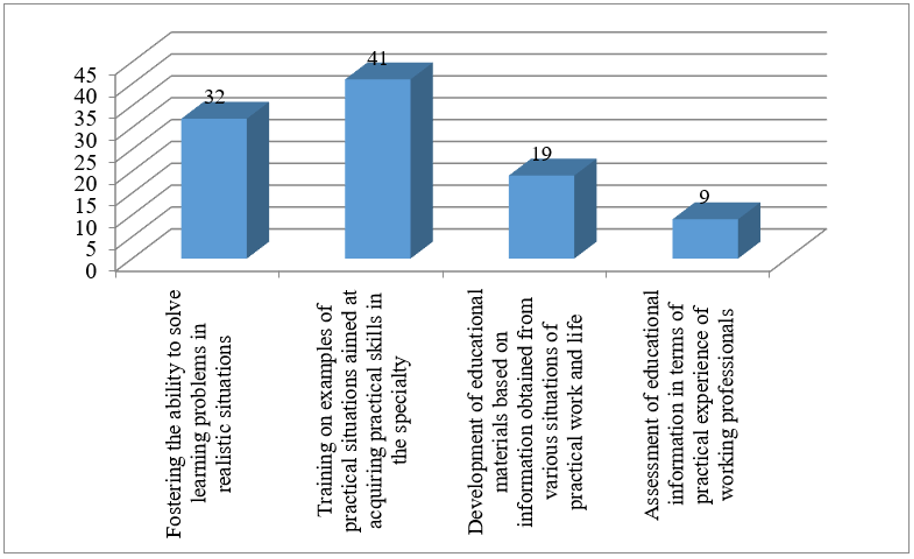
Figure 1. Understanding by students - future teachers of preschool educational institutions of the essence of components of contextual learning, %.
As it can be seen from Figure 1, the following students’ responses to this question were received, namely:
- fostering the ability to solve learning problems in realistic situations (32 %);
- training on examples of practical situations aimed at acquiring practical skills in the specialty (41 %);
- development of educational materials based on information obtained from various situations of practical work and life (19%);
- assessment of educational information in terms of practical experience of working professionals (9%).
According to the respondents’ responses, the overall result of applying the context approach contributes to the possibilities as follows (Figure 2):
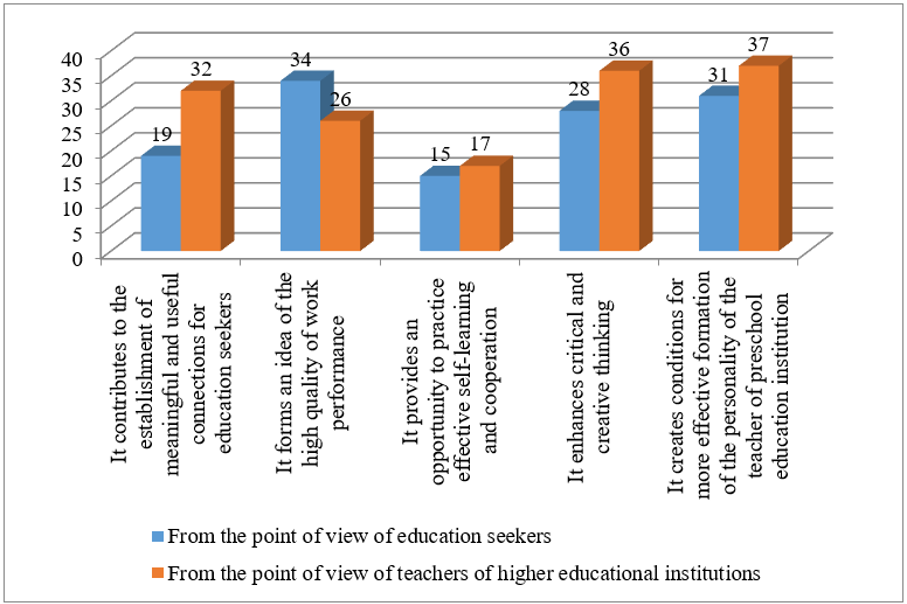
Figure 2. The overall impact of applying the contextual approach on the learning process, %.
As it can be seen from Figure 2, the application of the context approach in the educational process, according to the viewpoint of students and teachers, has the following advantages, namely:
- it contributes to the establishment of meaningful and useful connections for education seekers;
- it forms an idea of the high quality of work performance;
- it provides an opportunity to practice effective self-learning and cooperation;
- it enhances critical and creative thinking;
- it creates conditions for more effective formation of the personality of the teacher of preschool education institution.
The conducted survey has made it possible to identify the requirements for the educational process; consequently, the highest efficiency of context learning can be achieved through ensuring their implementation (Figure 3).
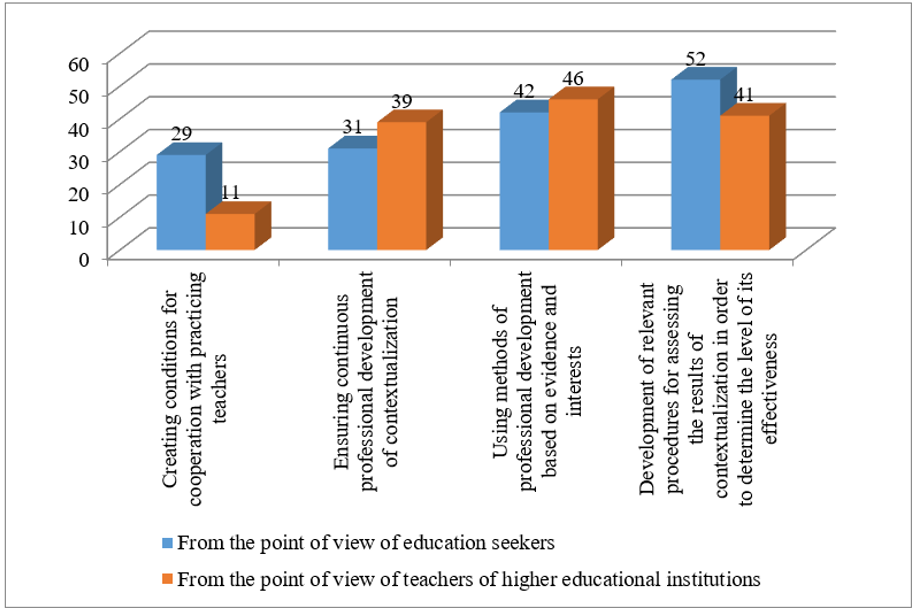
Figure 3. Requirements towards the educational process in order to ensure the highest efficiency of context-based learning, %.
From the point of view of teachers and students, the effectiveness of context-based learning is ensured by compliance with the requirements as follows:
- creating conditions for interdisciplinary cooperation with teachers: discussion of curricula, approaches to assessment, teaching methods; mutual visits; discussion of pedagogical practice of training methods and content of educational programs;
- ensuring continuous professional development of contextualization, initiation of its application;
- using evidence-based and interest-based professional development methods (for instance, training);
- development of relevant procedures for assessing the results of contextualization in order to determine the level of its effectiveness.
As a result of applying the context-based approach in the training process, the education seekers have acquired particular skills (Figure 4):
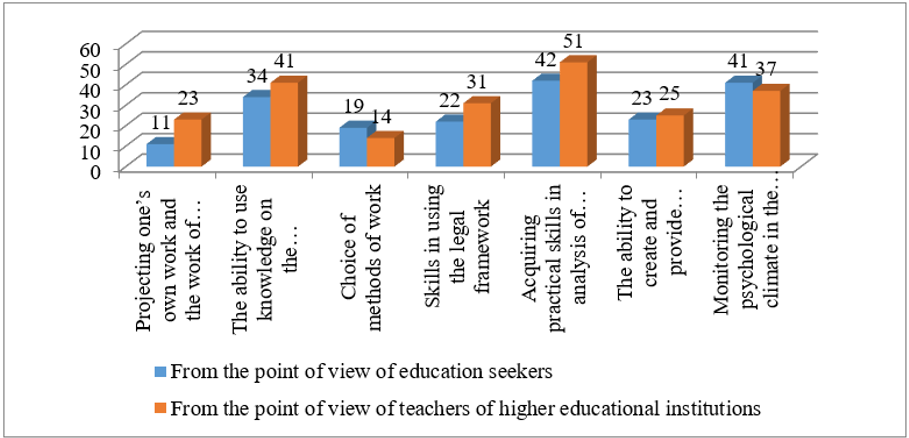
Figure 4. Skills acquired by the education seekers as a result of applying a context-based approach in the training process, %
They are as follows:
- projecting one’s own work and the work of the institution (goal setting, planning, structuring, forecasting);
- the ability to use knowledge on the methodology of preschool education in professional activities;
- the ability to adhere to general scientific principles in the organization of research in the sphere of preschool education;
- the ability to choose research methods based on the following requirements, namely: feasibility, availability, optimality and efficiency, etc.;
- the ability to apply regulations in order to analyze the objects of preschool education management (for instance, in the process of organizing activities, licensing and accrediting preschool educational institutions);
- skills for using knowledge about the patterns, functioning, development of the mental life of preschool-age children, modern concepts of the mental development of children in the analysis of the methodological support of the preschool educational environment;
- the ability to create and provide comfortable conditions for the development of children with the participation of parents;
- monitoring the psychological climate in the teaching staff of the preschool institution, maintaining the continuity of theoretical and practical training of employees, ensuring staff certification.
Analysing the prospects of applying the context approach in the educational process, students and teachers of higher educational institutions have expressed their standpoint on the most important and promising aspects (Figure 5).
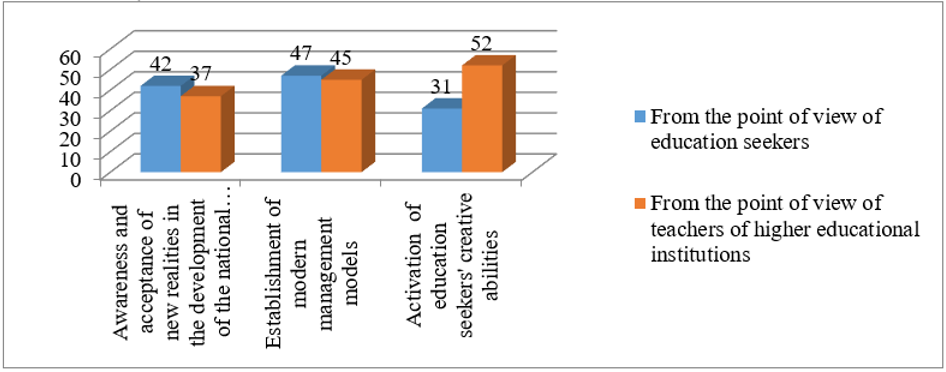
Figure 5. The most important aspects of applying the context-based approach that should be taken into account in the future in the process of training future teachers of preschool educational institutions, %.
As it can be seen from Figure 5, in the course of training preschool education professionals using a contextual approach, heightened attention should be focused on development in three directions as follows:
- Awareness and acceptance of new realities in the development of the national education system and the functioning of preschool institutions. In particular, attention should be paid to the focus on paradigmatic concepts of modern preschool education, changes in the regulatory framework of preschool education.
- Establishment of modern management models based on ideas about the value-semantic nature of educational management, including management in preschool education: interpretation of management as an integrative activity, which involves not only ensuring managerial influence (design, organization, modelling, diagnostics), but also activities aimed at ensuring the effectiveness of interaction at different levels of preschool education.
- Activation of specialists’ creative abilities in the field of preschool education within the framework of professional training; implementation of individual long-term plans for professional self-development of students, etc. This involves the creation of an educational environment of a context type, in which situations arise aimed at the formation of methodological competence.
Thus, the process of modernizing the system of higher pedagogical education, namely the sphere of training teachers of preschool educational institutions, at the present stage is connected with global trends in the introduction of a new paradigm aimed at professionalizing training future specialists of preschool education based on a practically oriented approach. This process is aimed at developing their general professional and special competence, professional-pedagogical and social-professional mobility, constructive thinking, the ability to adapt to changing conditions of educational activities in educational institutions and the effective solution of a wide range of professional problems.
The issues of using the context approach have been reflected in the scientific works of numerous scholars.
In particular, as Cherv'iakova N. notes, within the framework of competence-based, praxeological, practice-oriented approaches, a theoretical generalization and substantiation of ways to implement optimal strategies for projecting the educational process in higher education is carried out (Cherv’iakova, 2019).
Singal N., Pedderb D. and Malathyc D. agree with the above mentioned opinion, emphasizing that context-based learning aims to develop students’ practical skills and establish a connection between theoretical knowledge and real professional activity (Singal, Pedderb & Malathyc, et al., 2018).
Along with this, Bryant J., considering this approach to the organization of the educational process somewhat more broadly, points out that the essence of practice-oriented learning lies in constructing the learning process based on the unity of emotional and logical content components, acquisition of new knowledge and the formation of practical experience with its application in solving vital tasks and problems; emotional and cognitive saturation of creative search of students (Bryant, 2018).
Guo H. and Pilz M. interpret the practice-oriented approach in a slightly different way, characterizing this type of construction of the educational process as “a set of theoretical and methodological provisions” that make it possible to understand the practical activities of teachers as subject-object interaction, leading to changes not only in the object environment, but also the subject himself”, and social reality appears to him as a set of human practices (skills, abilities, methods of action, customs) (Guo & Pilz, 2020).
Therefore, consideration of the existing standpoints on the introduction of a context-based approach to developing the educational process in higher educational institutions in the course of training preschool teachers makes it possible to establish that the implementation of progressive trends in the development of preschool education is associated with a revision of traditional learning functions, active implementation of the reflexive-humanistic model in the practice of preschool educational institutions. This means that the perception of a preschool institution should take place as an institution of socialization responsible for mastering the basics of “the science of life” by the child, a change in orientation in selective diagnostics, the selection of education seekers according to indicators in favor of determining “the zone of proximal development” of each child, creating conditions for cultivating the creative activity of the child as an initiative subject of life instead of “stamping” and reproducing future teachers’ typical skills (Ilnytska, Opachko, & Rusnyk, 2018).
Conclusions
Thus, the analysis of the scientific literature suggests that the modern educator - nursery school teacher should possess theoretical knowledge and high pedagogical skills, creative potential, high professional culture, carry out innovative activities, conduct researches, adhere to spirited pedagogical standpoint, and be a supporter of modern pedagogy. It is the development of such skills that is facilitated by the context-based approach to the organization of the educational process in pedagogical institutions of higher education training teachers of the preschool level. After all, during its implementation, mastering by students of the practical experience of the work of preschool institutions is applied, raising the professional level and forming the skills necessary for higher education seekers in their future professional activities.
As a result of the questionnaire conducted in the course of the present research, it has been established that, according to the viewpoint of education seekers and teachers of the HEIs, the context-based approach consists mainly in using examples of practical situations in the educational process with the aim of obtaining practical skills in working in the specialty. The questionnaire has shown that the use of the context approach in the educational process, according to students and teachers’ standpoints, contributes to the establishment of significant and useful connections for education seekers, forms an idea of the high quality of work performance, and provides an opportunity to practice effective self-learning and cooperation. The survey has also made it possible to reveal that, according to the participants of the research, in the future, in the course of training preschool teachers by using the context-based approach, the necessity to accept the new realities of the development of the national education system, study modern management models and apply teaching methods designed to enhance creative abilities of education seekers should be taken into account.
At the same time, the research does not cover all aspects of the application of context-based approach in the process of training preschool teachers; consequently, further prospects of research center on studying complex integration approaches to introduction of context-based training of specialists of the specified profile.
